The music industry can be a lucrative investment opportunity or a bottomless money pit.
Fortunately, professionals in the industry are publicly listed and open for investment. In this article, we will review the music industry, how to invest in music stocks and profile the four best music industry stocks that lead the music industry segment.
If you are a music lover or a casual listener seeking investment opportunities in the industry, this article is a must-read. We'll help you walk away with the knowledge to make better-informed decisions about investing in music industry stocks and four stocks to consider.
Overview of the Music Industry
The U.S. recorded-music industry reached an all-time high of $15.9 billion in 2022. The popularity spreads through streaming services that introduce new talent rapidly, like Apple Music and Spotify. The global recorded music industry had $26.2 billion in annual revenues in 2022. The global music industry should grow at a compound annual growth rate (CAGR) of 14.7% to hit $103.7 billion by 2030. The music industry comprises many segments. It includes complementary segments, ranging from talent, music producers and publishers to promoters and digital streaming services.
The music industry continuously evolves with technological advances driven by cultural and social trends. Some regulatory bodies support, research, enforce copyright laws and advocate for the industry like the Recording Industry Association of America (RIAA). There's much controversy regarding the constant struggle for artists to make more from their music while recording companies try to recoup their investment in the artists. The struggle is real and continues for artists while consumers receive more options than ever.
Rising inflation has caused ticket prices to soar for live events. While music stocks are consumer discretionary stocks, the pent-up demand from the pandemic keeps fueling the market. More artists turn to live events to diversify their income stream and to keep a more significant portion of proceeds from their work.
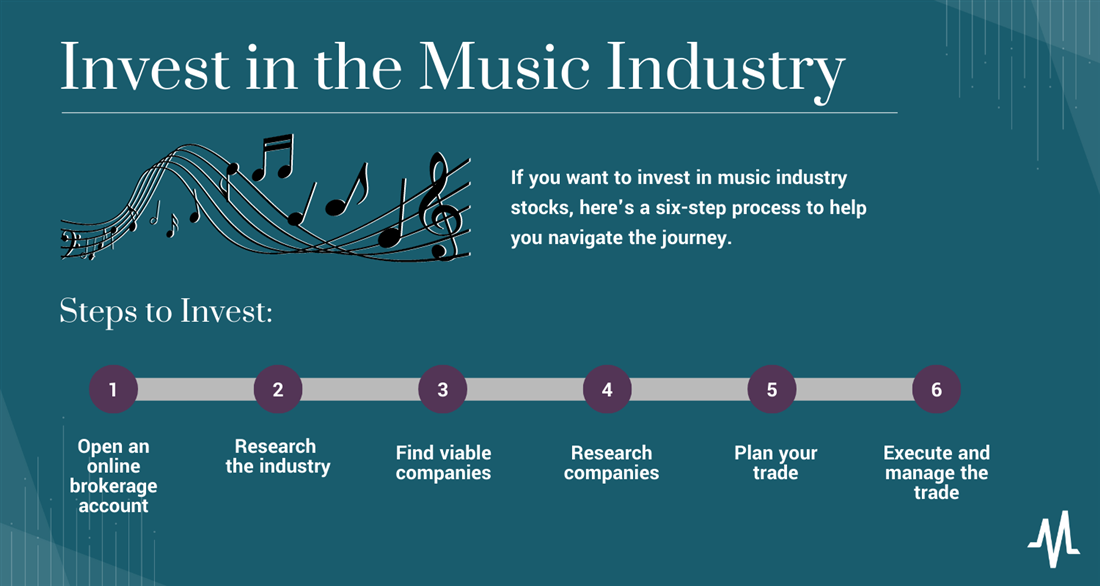
Why Invest in the Music Industry?
There are many reasons to consider investing in the music industry. It is a growing industry further accelerated by the popularity of reality TV shows and widespread digital streaming services. If music is your passion, you can have some "skin in the game," as they say.
However, rather than be a consumer that spends on music, you can be an investor that can also profit from the music business. Music industry stocks can help you diversify your portfolio.
They are growth stocks driven by social and cultural trends. The state of the economy impacts the music industry as abundant discretionary income helps music and concert sales. When the economy goes into recession, concert tickets and merchandise sales tend to suffer as consumers tighten their wallet strings. Food is more essential than live performances for a household.
How to Invest in Music Industry Stocks
If you want to invest in music industry stocks, here's a six-step process to help you navigate the journey.
Step 1: Open an online brokerage account.
Zero-commission brokers contain no frills but provide you with the essential functions of being able to buy and sell stocks without paying commissions. To be able to buy stocks, you will need an online broker. You can also consider a full-service broker if you want to consult a registered investment advisor before placing a trade. Full-service brokers also have research departments, but you will pay a fee.
Step 2: Research the music industry.
Familiarize yourself with the music industry by reading research reports, industry reports and industry news. Become familiar with trends and get an understanding of how the industry works. Use various resources to see as many perspectives as possible, whether favorable or not. As an investor, you must maintain objectivity and focus on the industry's economics.
Step 3: Find viable companies.
Use resources like MarketBeat to find companies in the music industry and potential music industry stocks to invest in. The site has tons of resources, including MarketBeat Original articles that can provide companies and analysis to help your research.
Step 4: Research companies.
Once you have your candidates, it's time to do the legwork and perform research. Fundamental research advocates that you read the company's latest quarterly report or 10-Q, earnings conference call transcripts, research reports and analyst ratings following the earnings. Be aware of the growth trajectory, profitability, income streams, forward expectations and catalysts. Note important dates for events, earnings reports, investor day and annual meetings. These are potential catalyst days where material news can move the stock price.
Step 5: Plan your trade.
Perform technical analysis, which is chart analysis to determine the trend visually, supports and resistance price levels. You can look for patterns like triangles, head and shoulders, flags, breakouts and breakdowns to help determine entry levels. Plan your entry, targets, stop-loss levels and allocations.
Step 6: Execute and manage the trade.
Use your broker to execute your trade(s). You can make several entries to get a better average price or one entry to save time. You can place limit orders at the desired price level(s) to take your position. Be patient and ensure you don't chase the stock or impulse trade.
Once you have taken a position, stay on top of the investment. Stick your target levels to trim out profits and stop losses to cut losses before they get too big.
Ways to Invest in the Music Industry
If you're looking for music industry stocks to invest in, but want to diversify into the significant segments of the industry, then here are four segments to consider. We also added a potential investment candidate for each segment.
Streaming
Instead of going to a music store, record shop or book store, consumers can access their favorite music instantly on mobile devices and through the internet. Only 9% of music sold as physical albums in 2022.
In 2023, 82.2 million Americans were paid music subscribers and over 600 million globally. Streaming music is accountable for 65% of the global recorded music industry sales. Streaming services comprised 83% of the U.S. music industry's revenues in 2022. The most popular streaming music platform is Spotify. While Apple Music and Amazon Music boast massive users, Spotify Technology S.A. NYSE: SPOT is a pure play for digital music and podcasts.
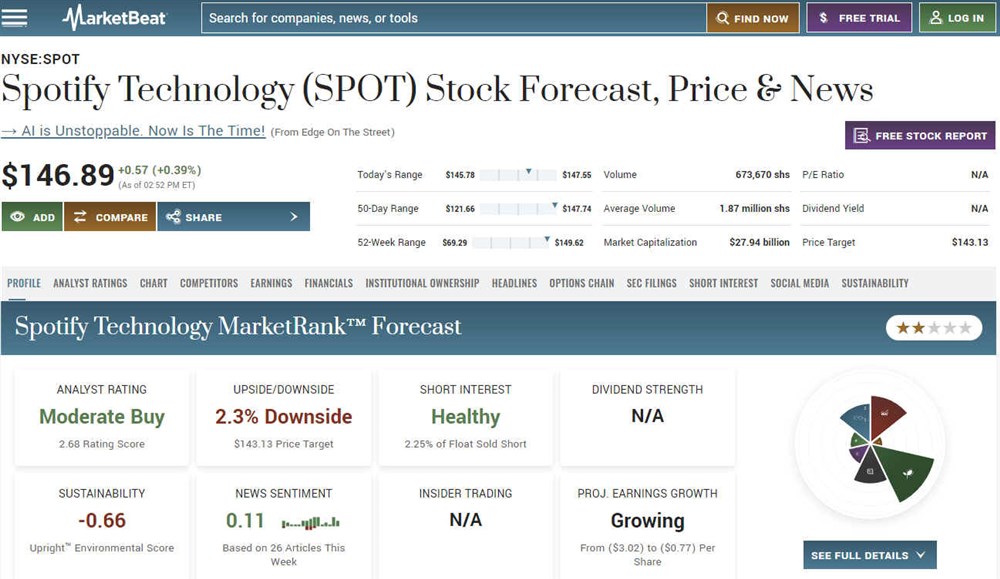
Spotify is the world's most popular streaming music service. It provides free ad-supported and paid premium ad-free listening subscriptions. The company has over 515 million monthly active users (MAUs) with over 210 million premium subscribers.
The platform provides access to over 100 million songs with the ability to play online or offline. It has music videos and other video content, including live performances. The platform has social features enabling users to connect, share music, and follow friends. With a library of over five million podcasts, Spotify is one of the world's largest podcast platforms, with over 28 million monthly listeners and the No. 1 podcast app in January 2023.
Spotify has launched video podcasts in beta to many beta users. The company has jumped on the artificial intelligence (AI) bandwagon by launching its own AI DJ to help personalization for users through generative AI text.
SPOT shares have a one-year performance of rising 39.4%. The company still loses money but is on a path to profitability as its revenues grew to over EUR 12.5 billion in 2022. Most of its premium paid subscribers come from the U.S. and Europe, but MAU growth grows in the rest of the world (ROW) segment. Look for Spotify analyst ratings and price targets on MarketBeat.
Music Publishers and Producers
Record companies are responsible for contracting, producing and promoting their contracted musical talent. They make the initial investment and recoup it back with a piece of all the sales. One of the largest music producers includes Warner Music Group Co. NASDAQ: WMG.
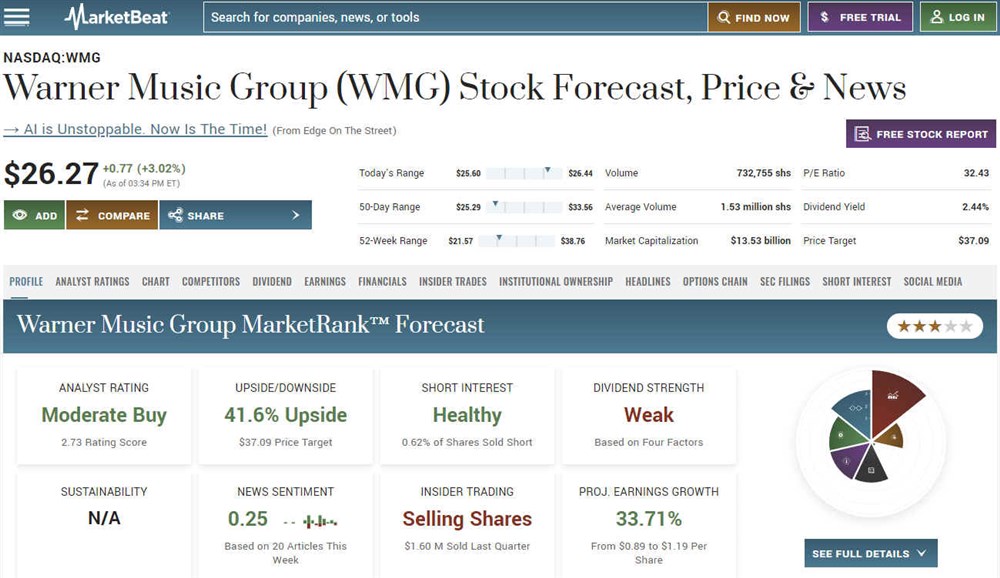
Warner Music is the third-largest recorded music publisher in the U.S. Its portfolio of recording artists includes Ed Sheeran, Lizzo, Cardi B, Stone Temple Pilots, The Eagles, Led Zeppelin, Dua Lipa and Wiz Khalifa. The company generated $5.9 billion in revenues in 2022. Warner Music Group operates many record labels under its recorded music division, including Warner Music, Atlantic Records and smaller brands, including Asylum, Big Beat, Reprise and Sire. This division will scout for talent under its labels, sign royalty contracts with recording artists and handle the marketing and promotions.
Its music publishing division manages the acquisition and licensing of nearly one million musical compositions with a catalog of over 100,000 songwriters and composers. The value of its owned compositions can justify higher multiples. As artists gain more rights to their recordings or music compositions, record labels must find more ways to generate revenues with fresh talent. WMG shares have a one-year performance of down (10.16%) with a 26.86 forward P/E and a 2.51% annual dividend yield. Check out Warner Music Group analyst ratings and price targets on MarketBeat.
Talent
Musical artists are the talent behind the music. While you can't buy stock in a musical artist's or rock band's shares, you can own shares in the company representing them. Agencies are in charge of booking gigs and making deals for artists, and they get a cut of what the artist makes. Endeavor Group Holdings Inc. NYSE: EDR is the top agency for representing music industry talent.
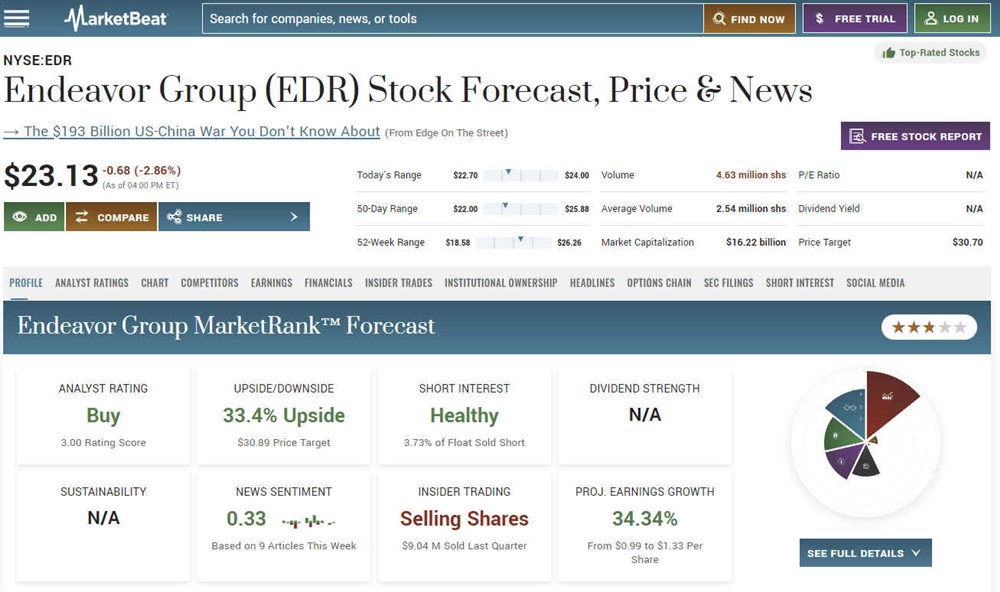
Endeavor Group is one of the largest talent managers in the world. The company has its hand in sports, fashion modeling, motion pictures and the music industry. It's a vertically integrated talent organization that represents, promotes, makes deals and supplies work for its talent and takes a cut of the artist's compensation. Its William Morris Endeavor (WME) Entertainment subsidiary is one of the world's largest music talent agencies.
The company generated $5.27 billion in revenues among all its divisions. Endeavor also owns the popular mixed martial arts league UFC, WWE and many sports franchises. Its talent agency William Morris Endeavor claims many top Hollywood actors as its clients, including Ben Affleck, Dwayne Johnson, Christian Bale, Jake Gyllenhaal and Jessica Alba. It recently divested 80% of its film and TV production division, Endeavor Content, to South Korean entertainment giant CJ ENM for $785 million to appease the Writers Guild of America for packaging, the same company owning the production of a film and also representing its talent. EDR shares have a one-year performance of down (10.16%) with a 26.86 forward P/E and a 2.51% annual dividend yield. Look for Endeavor Group Holdings analyst ratings and price targets at MarketBeat.
Live Events
Digital downloads and streaming have been detrimental to royalty income for musicians. Artists can make as low as $0.004 per stream or $4,000 for one million streams. As such, they've been forced to find other revenue streams to monetize their music, brand and talent. Live concerts and merchandise have become a significant source of income since the live experience can't be duplicated or replicated. There's nothing quite like attending a concert with thousands of screaming fans listening to your favorite band live and in living color. Live Nation Entertainment Inc. NYSE: LYV is the leader in live music concerts.
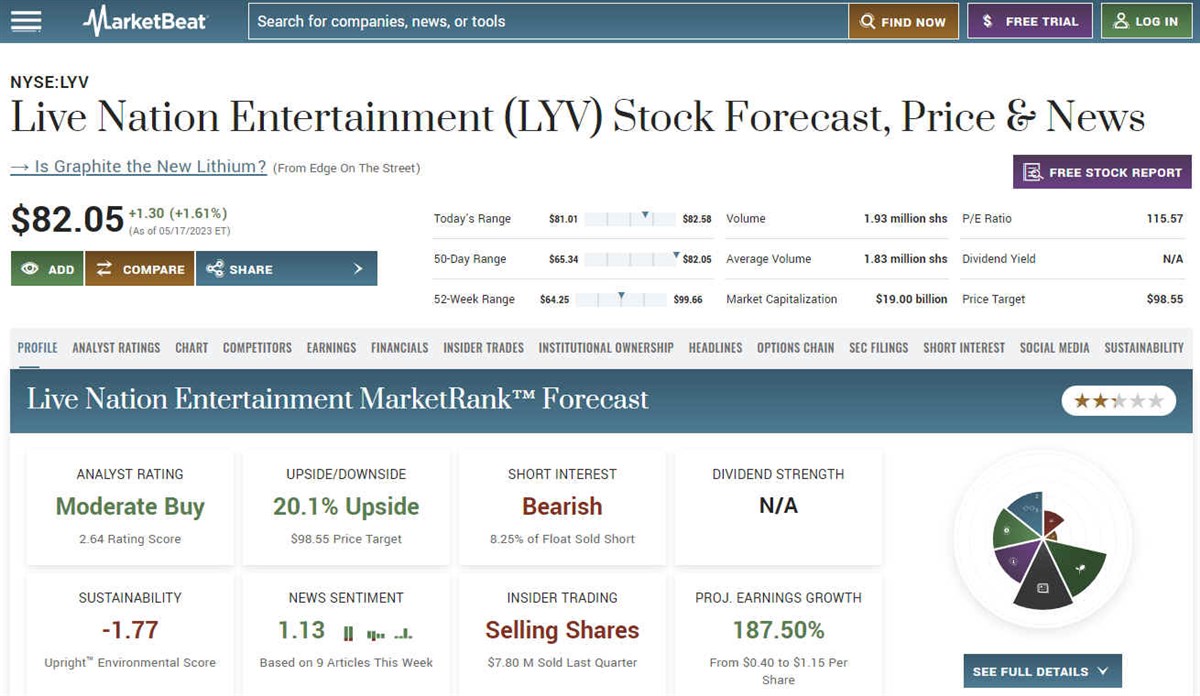
Live Nation is the largest live entertainment company in the world. This company has been accused of a monopoly on live concerts and has been sued over anti-competitive practices. The post-pandemic reopening surged the demand for live concerts as pent-up demand exploded.
Live Nation generated $16.68 billion in revenues for the full-year 2022. For the first time since the pandemic, all markets are fully open. Live Nation's revenues rose 73.9% in Q1 2023. Fan count rose 79% to 19 million across more than 45 countries. The company owns Ticketmaster. Ticketmaster sells tickets to live events, including concerts and in-demand sporting events for the NFL, NBA, MLB, NHL and even theater.
With a record number of fans, the company expects to sell more than 90 million tickets and will manage 600 million tickets globally in 2023. LYV shares have a one-year performance of down (4.25%) with a P/E of 115 and an 8.25% short interest. Look for Live Nation Entertainment analyst ratings and price targets on MarketBeat.
Impact of the Digital Revolution
The music industry has evolved from the days of vinyl records and cassette tapes to CDs to iPods and the ability to store over 10,000 songs on your phone and have access to hear millions of songs to stream. The evolution into the digital age has been good and bad for artists, while consumers have better access and options. There was a time when you had to buy a whole album to listen to the two good songs out of 10 tracks. Thanks to technological advancements, you can now buy each track individually and store them digitally, enabling access on your phone, music player, smart speakers, smart watches, tablet, laptop, car, TV or home entertainment system. For artists, streaming has forced them to find other revenue streams aside from royalties as checks dwindled. This is why live entertainment continues to grow.
FAQs
Here are answers to some frequently asked questions.
Can you invest in music stocks?
Yes, you can invest in various stocks in the music industry. The music industry stock market investors should know the segments and risks involved. Four key investment areas include publishing companies, talent agencies, streaming and live events. Each of these areas is covered with a top stock in this article. Music industry stocks are not usually blue chip stocks as they are volatile and rarely pay dividends.
How do you invest in music labels?
You can invest directly in the parent company of the labels. A public parent group usually owns the more prominent music labels. For example, Warner Music and Atlantic Records are two major recording labels under the Warner Music Group. They also own over ten smaller labels in their portfolio. Investing in the parent group allows you to invest in all those music labels.
Is it good to invest in music?
Music can be a good investment depending on your investment goals, risk tolerance and holding period. Music stocks can be a good investment to diversify your portfolio by adding consumer discretionary exposure. It can also feel good knowing that you have some skin in the game and can profit from something you may have a passion for outside of investing. It can be good on both a personal and a financial level, but you must also manage risk.
Before you consider Spotify Technology, you'll want to hear this.
MarketBeat keeps track of Wall Street's top-rated and best performing research analysts and the stocks they recommend to their clients on a daily basis. MarketBeat has identified the five stocks that top analysts are quietly whispering to their clients to buy now before the broader market catches on... and Spotify Technology wasn't on the list.
While Spotify Technology currently has a Moderate Buy rating among analysts, top-rated analysts believe these five stocks are better buys.